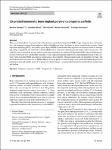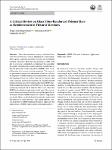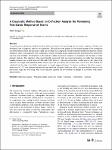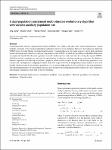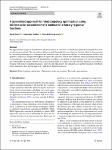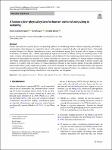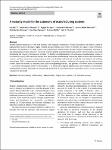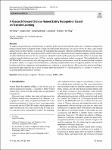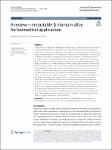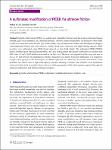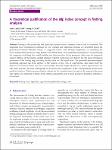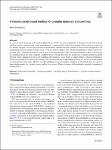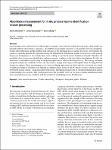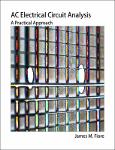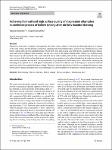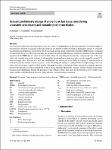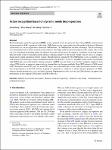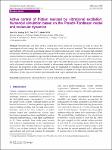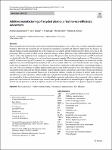Author
- Koichi, Hashiguchi (2)
- Lazinica, Aleksandar (2)
- Masami, Ueno (2)
- T. S., Amer (2)
- < previous next >
Subject
- robotics (9)
- Engineering (8)
- engineering (8)
- công nghệ (3)
- next >
Date issued
- 2020 - 2023 (215)
- 2010 - 2019 (28)
- 2001 - 2009 (6)
Has File(s)
- true (249)
OER - Kỹ thuật điện; Điện tử - Viễn thông (249)
Bộ sưu tập tài liệu học liệu mở dành cho ngành: kỹ thuật điện; điện tử-viễn thông
Item Title - Ascending [/1]
This research introduced a new poly-ether-ether-ketone calcium hydroxyapatite (PEEK-cHAp) composite for a convenient, fast, and inexpensive femur bone-implant scaffold with different lattice structures to mimic natural bone structure. Fused deposition modelling (FDM) was used to print a hybrid PEEK-based filament-bearing bioactive material suited for developing cHAp. Using FDM, the same bone scaffold PEEK will be fabricated, depending on the shape of the bone fracture. The scaffolds were examined for in vitro bioactivity by immersing them in a simulated bodily fluid (SBF) solution. Furthermore, in vitro cytotoxicity tests validated the suitability of the composite materials employed t... |
Since the nineteenth century, reinforced concrete was evolved as a crucial material for construction. This popular composite material is broadly used in different building typologies. However, the decaying of steel rebar due to corrosion is identified as a hindrance that can affect the quality of reinforced concrete structures. In reference to this, the glass fiber-reinforced polymer (GFRP) bar is essential because of corrosion-resistant properties. The researchers performed various tests and numerical analysis to know the response of GFRP-reinforced flexural members in shear and bending. Based on studies over the last decade, this study critically analyzes the response of flexural me... |
A non-destructive diagnostic method based on deflection analysis for monitoring the post-elastic response of beams was developed, and a diagnostic indicator was proposed. The indicator was defined as the second moment of the normalised curvature function about the mid-span, where the curvature was computed from the normalised deflection function. Elastic reference values of the indicator were computed for simply supported beams under uniformly distributed load, three-point, and four-point bending. Development of the indicator under progressive loading was examined with the help of finite element analyses. The indicator value monotonically decreased with increasing deformation provided... |
Constrained multi-objective optimization problems (CMOPs) exist widely in the real world, which simultaneously contain multiple constraints to be satisfied and multiple conflicting objectives to be optimized. Therefore, the challage in addressing CMOPs is how to better balance constraints and objectives. To remedy this issue, this paper proposes a novel dual-population based constrained multi-objective evolutionary algorithm to solve CMOPs, in which two populations with different functions are employed. Specifically, the main population considers both objectives and constraints for solving the original CMOPs, while the auxiliary population is used only for optimization of objectives w... |
The paper presents a rigorous formulation of adjoint systems to be solved for a robust design optimization using the first-order second-moment method. This formulation allows to apply the method for any objective function, which is demonstrated by considering deformation at certain point and maximum stress as objectives subjected to random material stiffness and geometry, respectively. The presented approach requires the solution of at most three additional adjoint systems per uncertain system response, when compared to the deterministic case. Hence, the number of adjoint systems to be solved is independent of the number of random variables. |
Human cyber-physical systems present an appealing platform for facilitating human-centered computing, particularly in environments where humans are required to interact with systems comprised of cyber and physical layers. Universally accepted elements of a human cyber-physical system, and interactions among these elements, do not appear to emerge in literature. To address this, a human cyber-physical system architecture is offered, led by the seafaring focus of this study. A human cyber-physical system implementation, called Mariner 4.0, for monitoring motion sickness of seafarers is presented to demonstrate the operation of a human cyber-physical system as a platform for human-center... |
Modern manufacturing has to cope with dynamic and changing circumstances. Market fluctuations, the effects caused by unpredictable material shortages, highly variable product demand, and worker availability all require system robustness, flexibility, and resilience. To adapt to these new requirements, manufacturers should consider investigating, investing in, and implementing system autonomy. Autonomy is being adopted in multiple industrial contexts, but divergences arise when formalizing the concept of autonomous systems. To develop an implementation of autonomous manufacturing systems, it is essential to specify what autonomy means, how autonomous manufacturing systems are different... |
The development of a planar manipulator with flexure joints and redundant actuation has been considered before, showing that the redundancy can be exploited to increase the support stiffness and to reduce static actuator loads. In this previous design the manipulator’s workspace has been defined to encompass all kinematically accessible end effector positions. In the current paper we reconsider the design philosophy. It will be shown that limiting the workspace (“less”) ultimately results in a better performance in a larger area (“more”). |
To improve the performance of named entity recognition in the lack of well-annotated entity data, a transfer learning-based Chinese named entity recognition model is proposed in this paper. The specific tasks are as follows: (1) first/, a data transfer method based on entity features is proposed. By calculating the similarity of feature distribution between low resource data and high resource data, the most representative entity features are selected for feature transfer mapping, and the distance of entity distribution between the two domains is calculated to make up the gap between the data of the two domains then model is trained by high resource data. (2) Then, an entity boundary d... |
Titanium and its alloys have already been widely used as implant materials due to their outstanding mechanical characteristics and biocompatibility. Notwithstanding this, researchers and businesses alike have continued to actively pursue superior alloys since there are still problems which need urgent consideration. One of these is a noteworthy difference in the implant material’s elastics modulus and that of natural bone, which result into an issue of stress shielding. With prolonged use Ti alloys releases dangerous ions. The Ti alloy surface has a low bioactivity, which prolongs the healing process. β-Ti alloys could be used as viable alternatives when creating dental implants. |
Polyether ether ketone (PEEK) is a widely used material for friction pairs due to its excellent mechanical strength, good wear resistance, and chemical inertness. However, some modifications are necessary when PEEK is used as a water-lubricated friction pair. In this study, a novel sulfonation method was developed to design a water-lubricated friction pair with ultralow friction, good wear resistance, and high loading capacity. PEEK powders were sulfonated using ClSO3H and sintered to form bulk plastic. The sulfonated PEEK (SPEEK) plastic exhibited good tribological properties. At a low sliding speed, the friction coefficient was smaller than 0.02 when a 3 wt% NaCl solution was used a... |
Fretting in the partial-slip and gross-slip regimes under a constant normal load is considered. The tangential force—displacement relations for the forward and backward motions are described based the generalized Cattaneo—Mindlin theory of tangential contact and Masing’s hypothesis on modelling the force—displacement hysteretic loop. Besides the critical force and displacement parameters (characterizing the triggering of sliding), the model includes one dimensionless fitting parameter that tunes the tangential contact stiffness of the friction—contact interface. Explicit expressions are derived for the main tribological parameters of the fretting loop, including the slip index and the... |
In a recent article (Frenning in Comp Part Mech 24:1–4, 2021), we demonstrated that a Delaunay-based strain estimate could be used as a starting point for the development of a particle-based method for continua. In this article, we argue that the Voronoi diagram, dual to the previously used Delaunay tetrahedralization, provides a more natural description of the underlying particulate system. For this reason, a Voronoi-based estimate of the deformation gradient is derived and used to the same effect. Although the gradient vectors cease to be antisymmetric, sums over nearest neighbors vanish, which results in a formulation that not only is linearly complete but also satisfies the patch ... |
Laser melting can be conducted in two different process regimes, the conduction and the keyhole mode, which exhibit significantly different characteristics, dynamics, and stability and are highly sensitive to a magnitude of process parameters. Despite these differences and the resulting high relevance of the prevailing process regime for process development, the regime is commonly deduced after specimen testing. An identification of the regime parallel to the process could speed up the process development of, for example, laser beam welding or laser-based powder bed fusion of metals. Therefore, the possibility of an in situ regime identification under process-near conditions is the ai... |
This text is based on the earlier Workbook for AC Electrical Circuits, which it replaces. The original expository text has been greatly expanded and includes many examples along with computer simulations. For the convenience of those who used the Workbook, many of the problem sets are the same, with some re-ordering depending on the chapter. |
Dimensions and surface roughness of magnesium alloy tubes were evaluated to elucidate the flattening behavior of asperity on the outer surface and the optimal condition for achieving thin wall and high surface quality in the combined process of the hollow sinking after die-less mandrel drawing. ZM21 tubes were drawn using a die after die-less mandrel drawing. Dimensions and surface roughness were measured, and the stress state of the asperity during hollow sinking was evaluated using finite element and slab methods. The results indicated that in hollow sinking after die-less mandrel drawing when the speed ratio was large, both a thin wall and high inner and outer surface qualities can... |
A low-noise low-pressure ultra-high-bypass-ratio fan stage to be implemented in the next generation of aircraft engines is described and evaluated acoustically with semi-empirical and analytical methods suited for preliminary design. As expected, good reduction potentials are observed for the jet noise and fan tonal noise components when the UHBR design is compared to current fans in service. However, concerns are identified for fan broadband noise, which are attributed to the off-design operation of the UHBR fan too close from its stability limit. By unloading the fan and thus reducing the size of the rotor wakes, the variable-area nozzle provides a substantial fan broadband noise re... |
Based on dynamic mode decomposition (DMD), a new empirical feature for quasi-few-shot setting (QFSS) skeleton-based action recognition (SAR) is proposed in this study. DMD linearizes the system and extracts the modes in the form of flattened system matrix or stacked eigenvalues, named the DMD feature. The DMD feature has three advantages. The first advantage is its translational and rotational invariance with respect to the change in the localization and pose of the camera. The second one is its clear physical meaning, that is, if a skeleton trajectory was treated as the output of a nonlinear closed-loop system, then the modes of the system represent the intrinsic dynamic property of ... |
Superlubricity and active friction control have been extensively researched in order to reduce the consumption of fossil energy, the failure of moving parts, and the waste of materials. The vibration-induced superlubricity (VIS) presents a promising solution for friction reduction since it does not require high-standard environment. However, the mechanism underlying the VIS remains unclear since the atomic-scale information in a buried interface is unavailable to experimental methods. In this paper, the mechanism of VIS was examined via numerical calculation based on the Prandtl—Tomlinson (PT) model and molecular dynamics (MD) simulations. The results revealed that the pushing effect ... |
Plastic materials have been widely used to replace metals in functional parts due to their lower cost and comparable technical properties. However, the increasing use of virgin plastic material in consumer and industrial applications has placed a significant burden on waste management due to the volume of waste created and the potential negative effects of its end-of-life processing. There is a need to adopt circular economy strategies such as plastic recycling within industrial applications in order to reduce this significant waste management pressure. The present study used recycled polylactic acid (PLA) material as a feedstock for the 3D printing of a centrifugal semi-open pump imp... |

